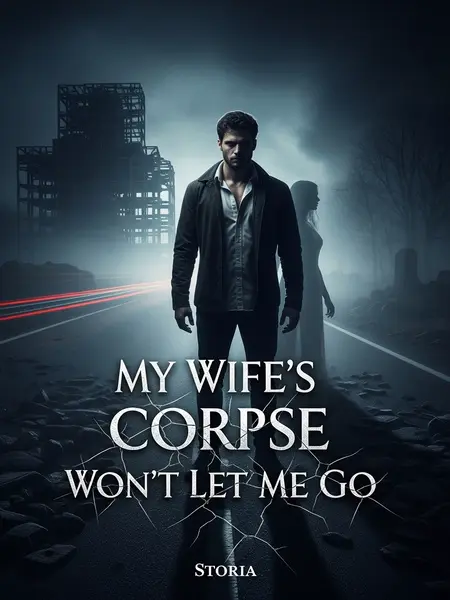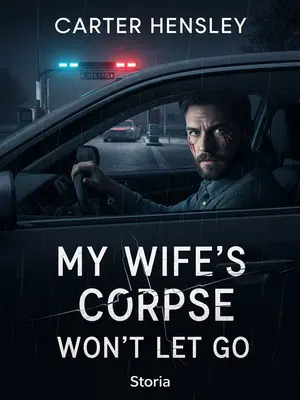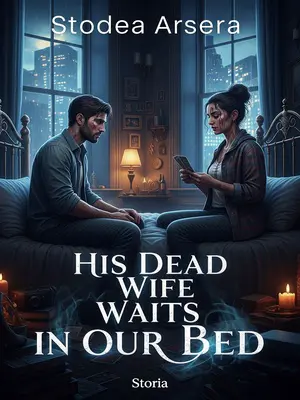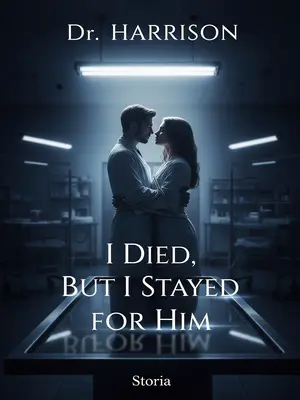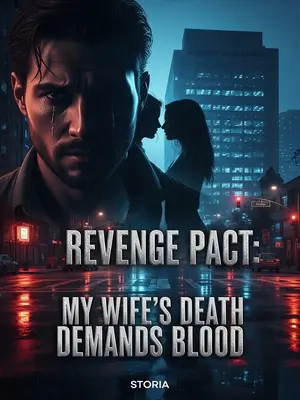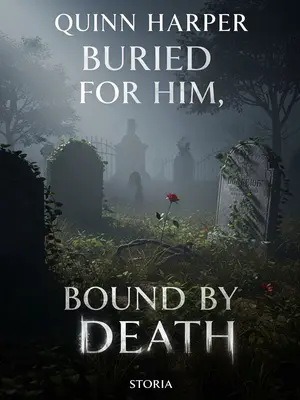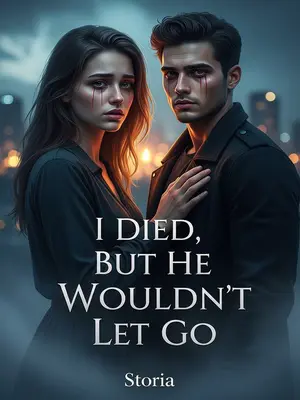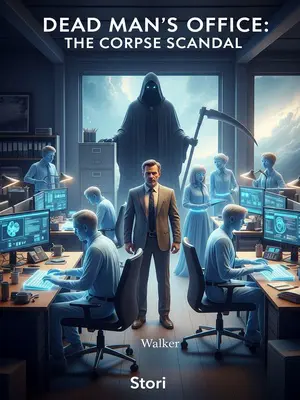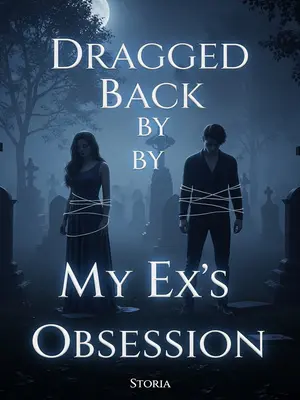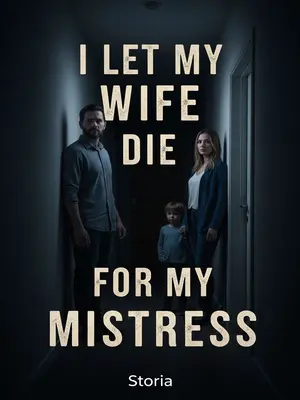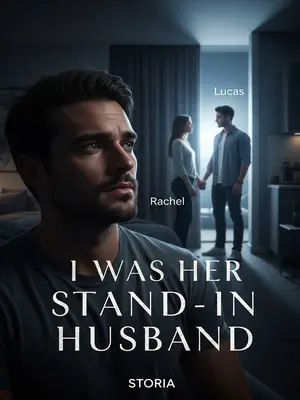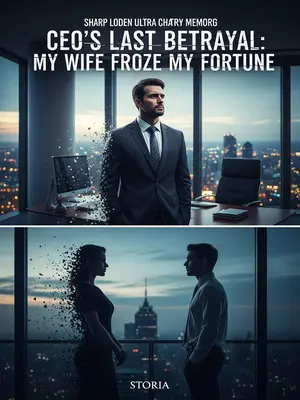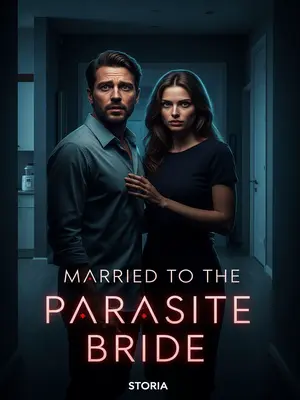Chapter 2: Haunted on the Highway
I tried to slow my breathing, counting backward from ten. The sound of her fists on the glass echoed in my skull. My hands were numb, my mind blank with terror.
Just a few minutes felt like an eternity. I sat frozen in the seat, every muscle locked, my calves starting to cramp. My legs started to cramp, but I didn’t dare move. Not even an inch. My wife jumped off the hood and paced anxiously beside the car. She’d notice the open trunk soon. Despair and terror left my mind blank. For a second, I even remembered how the trunk always jammed—how she used to nag me to fix it.
I remembered her laughter echoing in the kitchen, the way she used to roll her eyes when I forgot to fix the leaky faucet. The memory was so vivid it made my chest ache. For a second, I almost called out her name, as if she might answer like she used to, soft and tired after a long day.
I don’t know how long I was out of it when a strange, vacuum-like silence yanked me back. A chill shot up from my feet, freezing me in place. I forced myself to turn. My wife’s corpse was in the trunk, staring at me. Her legs bent, arms braced on the ground. Her neck looked longer, her head stretching through the gap between the seats, her plaster-like face pale and stiff, only half an arm’s length away. Slowly, her mouth stretched wide open, showing two rows of white teeth.
I felt my bladder threaten to give. My vision tunneled, black at the edges. The silence was so deep I could hear my own heartbeat, slow and thunderous.
Extreme fear made me go eerily calm. I quietly unbuckled my seatbelt, holding the latch in my hand, staring at her with a blank face while my mind raced, planning an escape. I’d noticed earlier that, since I was planning to dump the body, I’d been driving toward a remote spot. Now, there was no one around, and not far off in the night was a building—just a skeleton, probably an abandoned construction site. That was my only hope. As soon as the monster that was my wife’s corpse attacked, I’d jump out and make a run for it. That was the only shot I had.
I could see the building’s outline against the night sky—unfinished steel beams, graffiti scrawled on the plywood. The wind rattled loose plastic sheeting, making a sound like distant applause. I took a deep breath, the taste of blood and adrenaline sharp on my tongue.
She twisted her neck left and right, like a writhing worm, her face a grotesque mask. My heart pounded so hard it hurt. Every nerve was taut, waiting for the moment. She didn’t attack for a long time, and my mind started to wander again, picturing the car door stuck or me tripping as I jumped out. I couldn’t take the tension anymore and suddenly let go. The seatbelt snapped back with a "whoosh," like a snake in the dark. My wife’s corpse was distracted. I took the chance to yank open the door and bolted.
The night air hit me like a slap. Gravel crunched under my sneakers as I sprinted. My lungs burned, every breath ragged and desperate. The world narrowed to the sound of my own feet pounding the ground.
The abandoned building was about a hundred yards away. I ran for my life. The night air burned in my lungs, which felt like they were about to burst. When I reached the building, my vision went black—I couldn’t tell if it was the darkness or lack of oxygen. I barely managed to brace myself against a cement wall to keep from collapsing. I felt like if I didn’t catch my breath, I’d drop dead right there. The first floor was littered with construction debris. Scaffolding still stood, draped with tattered safety nets. The building had almost no exterior walls. There was nowhere to hide, so I forced myself to keep running upstairs. Every step on the stairs kicked up dust. The sound of my shoes scraping the cement made my heart race. I tried to tread lightly, but I couldn’t avoid making noise.
I could smell old sawdust and mold, the musty scent of rain-soaked plywood. My foot caught on a stray length of rebar, and I nearly went down. Somewhere below, a rat scurried through the debris. I kept moving, driven by pure terror.
Just as I was debating whether to take off my shoes, a strange sound came from downstairs. Rustling, rustling, like many feet scraping quickly across the ground. The sound made my skin crawl. I couldn’t imagine what my wife’s corpse had become to make that noise. There was no time to take off my shoes or worry about the noise—I just kept running up. I lost track of how many floors I’d climbed. Soon, there were rows of concrete pillars. I ran to the innermost corner and hid behind a huge pillar.
I pressed myself flat against the cold concrete, trying to slow my breathing. I listened to the sound—faster now, frantic, searching. My heart hammered against my ribs, threatening to break free.
The rustling sound got closer and closer. I pressed my back tightly against the rough concrete, trying to melt into the shadows, eyes squeezed shut, silently chanting, "It’s all in your head, all in your head..."
I remembered the coping tricks from therapy: focus on your senses, name five things you can see, four things you can touch. But all I could feel was terror, all I could see was darkness.
I wasn’t crazy. I did have some mental health issues, but not to the point of losing touch with reality. I often had hallucinations—maybe it was because of my job. My hallucinations were always terrifying, always life-or-death. And even though I knew they weren’t real, I couldn’t break free. It wasn’t my fault—no one can snap themselves out of a hallucination by willpower alone. Mental illness can’t be self-cured, or there wouldn’t be so many people struggling with it. I studied psychology in college; if anyone knows this, it’s me. My wife’s corpse must still be lying in the trunk, and the monster chasing me is just a hallucination. But even so, I couldn’t help being scared. Hallucinations might be fake, but the fear is real. That real fear is enough to wreck a person’s mind, even cause a heart attack—scare someone to death. If I’m killed by the monster in my mind, people will just find a body dead from a panic attack. To escape this terror, I needed outside help—a therapist, a cop, even a pizza delivery guy... As long as someone could do something, say something, to pull me back to reality.
I’d always told myself I could handle it alone. But tonight, in this hollowed-out skeleton of a building, I’d never felt so helpless. I would’ve traded every book I’d ever written just to hear another human voice, to know I wasn’t alone with the thing in my head.
The rustling stopped. I froze, then realized—the monster had stopped on my floor. A chill shot down my spine and paralyzed me. I wanted to turn around but couldn’t move. After a brief silence, the rustling started again. But it wasn’t going up or down; it was coming toward me. It was slow, as if my wife was searching for me. She found me on this floor? Unbelievable. Suddenly I remembered the dust on the ground. Footprints—it was the footprints! Despair washed over me like a bucket of ice water. I leaned my head against the pillar, my mind slipping away again, like a rusty old machine grinding to a halt.
I pictured the dusty footprints I’d left behind, a glowing trail for the monster to follow. My vision blurred. I bit down on my lip, trying to keep from screaming.
As my consciousness faded, my hand touched something cold, rough, and hard. I shuddered, my mind snapping back. I grabbed the brick I’d found and, using all my strength, hurled it out of the building. With no exterior walls, the brick arced into the night and shattered on the ground. I didn’t know if it would fool my wife’s corpse, but it was all I could do. Behind me, the rustling suddenly grew frantic. From the sound, she was racing downstairs. I silently thanked God and turned toward the stairwell. A long, thin shadow nearly six feet long flashed under the dim moonlight, slithering close to the ground, with two thin legs at each end. My stomach churned and I nearly threw up. I finally understood what that rustling was—it was the sound of something moving like a snake, its body writhing and scraping along the ground.
I covered my mouth to stifle a sob. The image burned into my mind, impossible to forget. My hands shook so badly I almost dropped my phone.
How could my wife’s corpse turn into such a monstrous thing? She was my wife! The woman I’d loved for years. How could I imagine her like this? A cold wind swept through the building, making me shiver. My shirt was soaked with sweat, cold and clammy against my skin.
The wind whistled through broken windows. I hugged myself, shivering, feeling the weight of guilt and grief pressing down. I kept moving, step by step, because stopping meant dying.
My wife was dead. She died from poisoning. I bought the poison. I had severe depression and had tried to end my life more than once. A few days ago, I bought poison online and hid it deep in a kitchen cabinet. Today, my wife went out. I planned to end it all while the house was empty. But my editor from the publishing house showed up out of nowhere, talked with me for hours, and then dragged me out for dinner. By the time I got home, exhausted, I’d forgotten about the poisoned lemonade on the table. When I finally remembered and rushed back, I found my wife collapsed on the floor, already gone. There was no way to explain. I wasn’t afraid of dying. But I couldn’t be a murderer. I couldn’t let my parents carry that shame. I couldn’t let the world hate me. And if I was convicted, all my work would be pulled, half a lifetime’s effort gone, and my parents would lose everything. I sat beside my wife’s body, crying for hours, and finally made a terrible decision—to secretly get rid of her body. Her parents had passed away, and she didn’t have many close friends. If I handled it right, maybe I could cover it up. I put her in the trunk, planning to drive somewhere remote and bury her. I never expected another panic attack on the way.
The guilt never let up. It gnawed at me, night after night, a constant companion. I could still see her face, peaceful in death, and the empty glass on the table. I’d replayed that moment a thousand times, wishing I could go back, wishing I’d remembered sooner. But wishing never changed a damn thing.
From a distance, the top floors of the abandoned building looked even darker, probably because more of it had been built. These half-finished places were everywhere—just the frame done, a few floors closed in, then the money or permits ran out. I climbed two more flights and found a half-enclosed space with corridors and rooms half-built. I found a hidden HVAC room, squeezed inside, and curled up in the darkest corner I could find. The urgent thing now was to find someone I could trust to save me. It had to be someone who, even if they found my wife’s body, would help me cover it up. My parents weren’t in this state. The only person I could call was my friend and agent, Lucas Everett. I took out my phone and sent him a Facebook message begging for help, along with my location. It was already 11:30 at night. I worried he might be asleep. Then, suddenly, my phone lit up. It was him.
My thumb fumbled over the answer button, my hands slick with sweat. Lucas’s voice crackled through the phone, warm and familiar, laced with confusion and concern. “Carter? Are you okay? Where the hell are you?”
I pressed the phone to my ear, my voice barely above a whisper. “Lucas, I need you. Please. Something’s happened. I’m at an abandoned site off Route 6, near the old water tower. I—I can’t explain. Just come. Please, man.”
Lucas didn’t ask questions—he never did, not when it mattered. “Stay put. I’m on my way. Ten minutes, tops. Don’t hang up, okay?”
For the first time all night, I felt the faintest flicker of hope. I squeezed my eyes shut, clutching the phone like a lifeline. Somewhere in the blackness, footsteps echoed—real or imagined, I couldn’t tell. But I held on, waiting for the sound of Lucas’s car, for the promise of rescue, for a way back to the world of the living.
